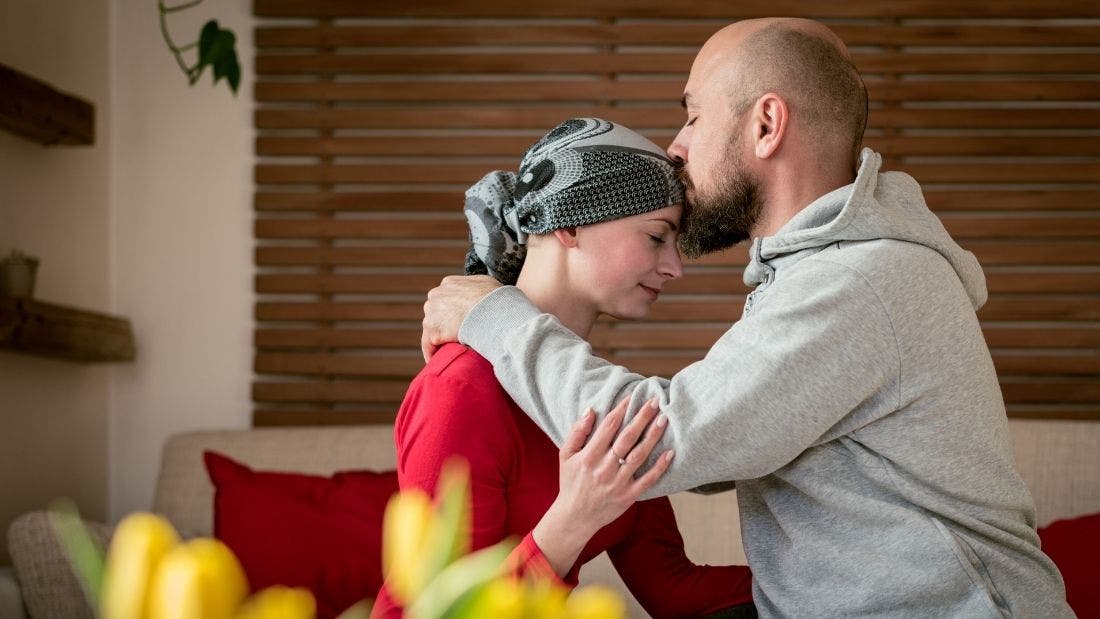Sex with Cancer
One of the most memorable plotlines from HBO’s Sex and the City followed Samantha Jones, a vibrant woman with a passionate sex life, as she deals with her breast cancer diagnosis. Her libido, arguably Samantha’s most memorable character traits, dissipated as she went through treatment and took a while to return once she went into remission.
Samantha Jones might not be real, but the character’s struggle depicted something millions of people deal with every year: the effects of cancer on your sexual health.
Cancer takes a heavy toll on the mental, physical, spiritual, and sexual health of those living with it. The stress from a cancer diagnosis can affect your physical health, and your physical health can impact your mental health. Some cancers directly affect sexual organs and the reproductive system. Surgeries, hormone therapy, and chemotherapy can be intense.
Cancer and its different treatments have a profound effect on the body’s hormones. Low libido is one of the more well-known side-effects of chemo. Depending on your type of body, other symptoms may include hot flashes, irregular periods, dryness of vaginal tissues, early onset of menopause, erectile dysfunction, and lower sperm count. All types of bodies will experience illness and treatment uniquely.
Your sexual wellness is a key piece in your overall wellness, not something separate. Finding ways to stay in touch with your sexuality and nurture that part of yourself—whatever it looks like for you personally—is equally important as restoring the other atrophied aspects of your health.
Talk It Out
Good communication is always the best place to start. Cancer can be an isolating experience. Allow your loved ones to be there for you while you navigate your diagnosis and treatment.
Let your partner know how you’re feeling and what you need from them. While it’s always good to be aware of other people’s feelings, you do have to prioritize your own health. So if sex is not something you are emotionally or physically capable of, tell them. Sex should never, ever be an obligation or a chore. A good partner will understand that your sex will look different for a while.
Don’t just talk with your partner: talk to your doctor about what you’re experiencing. Unfortunately, sexual dysfunction is not usually a topic that gets a lot of attention when designing a care plan.
Time will help set things back to normal, but in the meantime, your doctor might be able to recommend some medications and therapies to help rekindle your sex drive. Macmillan Cancer Support, a UK based cancer charity, recommends these tips for talking with your healthcare providers about your sexual wellness:
However you choose to talk with your health care providers, it’s important to be honest with them about what you’re experiencing and what your goals are.
Practice Self Love
For those who are single and have lost their libido, this can affect your dating life if that’s something you’re interested in. Love does not have to strictly come from a partner. Indulge in your other relationships: family, close friends, pets, self-love. Just because you are single does not mean you are alone.
You can still nurture your own sexual health, with or without a partner. No matter what your relationships with others look like, your relationship with yourself will always be one of your most important. Learn to find ways to refill your cup.
Cancer can also affect your appearance, which in turn can affect your perception of yourself. If you’re experiencing this, it's completely normal and you’re not alone. Take time to reacquaint yourself with your body and reintroduce yourself to the things that give you pleasure—in all aspects of your life. You’re experiencing something physically and emotionally draining. Give yourself permission to indulge in things that make you feel good, whatever this means: nail polish, a favorite shirt, some new lipstick.
It can be hard to feel beautiful under the best of circumstances. Don’t pressure yourself to love your body, and don’t shame yourself for any disappointment you might currently be experiencing. When finding beauty in ourselves feels a bit out of reach, it can help to take a neutral view and try to appreciate it as it is and what it can do for us.
You are so much more than just your body.
Stay Connected
Sex is fun, but it can also be physically and emotionally exhausting. And if you’re tired from working to combat a serious illness like cancer, it’s totally normal to be too tired for sex or for sex to longer be a priority.
You and your partner can be intimate without engaging in physical sex. The Dana-Farber Cancer Institute recommends activities like intentional relaxation, giving each other a massage, or sharing a bath as ways to be intimate without sex. Physical touch and quality time can go a long way toward making your partner feel loved.
If you are ready to engage in partnered sexual activity, you might need to rethink how you go about it. As always, lube is your friend. It is the best way to decrease pain and discomfort and increase pleasure. If penetration is something you are struggling with, consider adding external stimulation to the line-up.
Dana-Farber offers some more helpful tips for partnered sex, such as planning time for intimacy when you’re well-rested, utilizing positions that require less energy, and strategizing who plays the more active role during sex.
Don’t push yourself more than you are able to. Try new things, a little bit at a time, and see what works for your comfort level.
Most importantly, be gentle with yourself. There is no timeline you have to follow other than your own.
This too shall pass.


